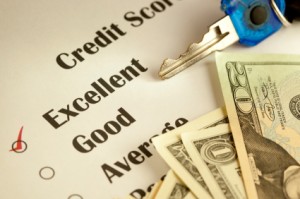 Do you have bad credit?
Do you have bad credit?
So do millions of other Americans – I’ve been there too. Fortunately living with a poor score is not as nightmarish as it sounds.
Here are 7 warnings, tips, and methods to help you come through the other side …
1. Be Prepared to Pay Deposits
Lending, providing services, renting out a property; all these things are about risk and if you have bad credit, providers need reassurances that you will fulfill your obligation. One way they do this is to require deposits, which might be looked at as a form of insurance.
You must be prepared to pay a deposit when taking out services like cell phone plans and wireless contracts, though if this doesn’t suit your situation consider using a prepaid plan where you pay for what you use up front and once it’s gone it’s gone.
This won’t help your score because it’s not a form of credit, but it will help you get back on your feet.
Likewise, landlords will often ask for a larger deposit than normal to take you on as a tenant, so make sure you take this into account when budgeting for your first month in a rented property.
2. Be Open and Proactive with Employers and Landlords
It’s not just landlords and property agents that assess your credit, sadly even some employers will run a credit check as well and it may be held against you if you’re neck-and-neck with another candidate with a good score.
While this blanket approach can seem unfair there are ways to cut through it.
If you go on a job interview or property viewing be open about your credit score and show them that you are an individual that’s going to make it work.
With a landlord, bring your proof of income (bank statements etc) as soon as possible, even if they don’t ask for it. Agree to move in right away or agree to pay slightly higher rent – go above and beyond.
The key is to be open and honest, start a dialogue and be flexible. Don’t enter the situation pessimistically and then concede defeat as soon as a credit check is mentioned.
3. Cut Costs to Repay Debt Faster
Living with bad credit is only a temporary situation, as your aim should always be to reduce bad debt and rebuild your credit score. If you have bad credit and are still struggling with debt it’s time to make a budget and cut costs, so that extra money can go towards repayments.
You’d be surprised how many of your monthly expenses can be reduced – from changing your cable and cell phone plans to switching to energy efficient light bulbs, to buying generic brands at the grocery store and bringing your own lunch and coffee to work.
Remember: This doesn’t have to be forever.
4. Use Cosigners and Guarantors
One way to gain access to loan products and rental properties when you have a particularly bad credit score is to use cosigners or guarantors. This is when a friend or family member also signs the contract and agrees to take on the financial burden should you fail to make payments or rent.
Of course, you should only enter this kind of agreement if you know you can meet the terms. You don’t actually want to leave your best friend or mother paying off your debts.
5. Borrowing Is Still Possible
Many erroneously believe that a bad credit score is an automatic barrier to getting any kind of loan, but there are many lenders out there that will fairly assess applications and take in to account your employment and income status without just relying on a credit check.
Established payday loan services like ElcLoans routinely help those with bad credit get access to short-term loans that function like an advance on wages. Of course, the trick is to only use them when you genuinely need some breathing room and will be able to repay the loan when your next paycheck arrives.
Once it’s paid off you might then see a small boost to your score.
6. Begin Rebuilding Your Credit Score
Part of living with bad credit is also rebuilding it. This means pulling your credit reports and checking that everything is accurate. Sometimes errors on the report can accidentally result in a lower score, so get them fixed.
Gather your proof and a simple letter or phone call should suffice in most cases.
Rebuilding your score also means settling and negotiating outstanding accounts. If you’re struggling to repay a debt, as long as you start a dialogue and show good faith, you may be able to negotiate it to a lower amount, arrange a more manageable repayment plan; or if you pay a lump sum, write it off completely.
If your outstanding debt is not causing you day to day problems, you should now start considering borrowing again to bump the score back up. Start small (groceries on a credit card, a new cell phone contract) and work your way up.
7. Ultimately, Don’t Obsess
Bad credit can be a barrier to the best loans and certain products and services, but as long as you have an income you can still live a happy and fulfilling life. Obsessing over the score is just going to cause unneeded stress.
Ultimately it’s just a number on a screen and by no means the end of the world.
